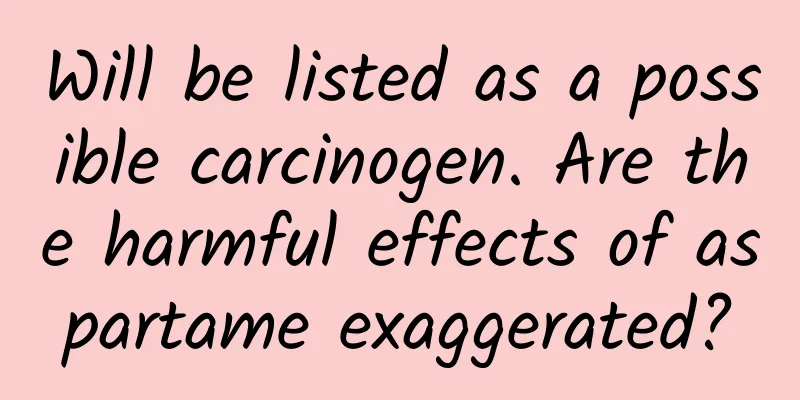Will be listed as a possible carcinogen. Are the harmful effects of aspartame exaggerated?

|
Aspartame is one of the most well-known sugar substitutes. It can be found in daily beverages and snacks such as Coca-Cola sugar-free soda and sugar-free chewing gum. On June 29, the topic of "aspartame causes cancer" became a hot search. The reason is that, according to foreign media reports, people familiar with the matter revealed that aspartame will be listed as a "substance that may be carcinogenic to humans" for the first time in July this year by the World Health Organization's cancer research agency, the International Agency for Research on Cancer (IARC). This heavy news has sparked heated discussions among netizens. Some people said that the "happy water" is not so happy anymore, and some people joked, "Drink it quickly, it won't cause cancer this month"... As an artificial sweetener, what is the origin of aspartame? Why is it involved in a cancer-causing controversy? This issue of Health Focus explains it for you! 1. A brief history of aspartame Chemist licks his fingers and makes an unexpected discovery while turning pages of a book In December 1965, James Schlatter, a researcher at Searle Corporation in the United States, conducted experiments on the combination of various amino acids while studying drugs for the treatment of gastric ulcers. In the process of synthesizing the compound, he accidentally got some powder on his fingers. He knew that this amino acid mixture was non-toxic, so he didn't rush to wash his hands immediately. Later, he licked his fingers to get a piece of weighing paper, and suddenly he felt that his fingers were very sweet. Aspartame was discovered in this way. Approved for use by nearly 100 countries around the world Later, after extensive research on aspartame, the U.S. Food and Drug Administration (FDA) allowed it to be used as an additive in the production of some foods in 1981. In 1996, the FDA allowed it to be used in the production of any food, including heated and baked foods. As a widely used artificial sweetener, aspartame has been approved by nearly 100 countries around the world and is used in thousands of foods, beverages and medicines. 2. Does aspartame really cause cancer? What are carcinogens? The International Agency for Research on Cancer (IARC) classifies carcinogens into four categories based on the weight of evidence of carcinogenicity: Class 1 carcinogens are substances that have been proven to cause cancer in humans. Common examples in our daily lives include asbestos, cigarettes, betel nuts, salted fish, arsenic, alcohol, aflatoxin, etc. You should avoid them if you can. Class 2A carcinogens have been proven to be carcinogenic to animals, but there is insufficient evidence for their carcinogenicity to humans. Common carcinogens include fried foods, nitrates, etc. Class 2B carcinogens may be carcinogenic to animals and may also be carcinogenic to humans, but there is insufficient evidence. Common ones include electromagnetic waves, gasoline engine exhaust, etc. There is insufficient evidence for the carcinogenicity of Class 3 carcinogens to both animals and humans. Common ones include food coloring, caffeine, saccharin, etc. Class 4 carcinogens refer to substances that have not been proven to be carcinogenic and are probably not carcinogenic to humans. Currently, only caprolactam is on the carcinogenic list, and we rarely have the opportunity to come into contact with it in our daily lives. Before the official release of the results, it is still unclear what the International Agency for Research on Cancer (IARC) based its conclusion that aspartame may cause cancer. What carcinogenicity level will it be classified as? Some media asked the WHO for confirmation and received a reply that it would publish relevant content on this topic on July 14, but did not disclose the specific content. The International Agency for Research on Cancer (IARC) reportedly made the decision earlier this month after a review by external experts. The decision does not take into account how much of the product an individual can safely consume, as recommendations for individuals will be made by the World Health Organization's Expert Committee on Food Additives (JECFA) and national regulators. The WHO Expert Committee on Food Additives (JECFA) was established in 1955 and has consistently stated since 1981 that aspartame is safe within acceptable daily limits. This year, JECFA is also reviewing the use of aspartame. It is reported that the JECFA review meeting began at the end of June and is expected to announce the results of the review on July 14. A spokesperson for the International Agency for Research on Cancer (IARC) previously stated that the research results of IARC and the WHO Expert Committee on Food Additives (JECFA) were confidential until July, but the two were "complementary". The conclusions of the International Agency for Research on Cancer (IARC) represented "the first basic step in understanding carcinogenicity", while the review of the WHO Expert Committee on Food Additives (JECFA) "conducted a risk assessment" to determine the possibility of specific types of harm (such as cancer) occurring under certain conditions and exposure levels. Friends who are interested can wait for another half a month and wait for a report from the World Health Organization. 3. Beware of the "sweet" trap From the current definite conclusions, people must be clear about two points about aspartame: 1. Don’t use sugar substitutes to lose weight In May this year, the World Health Organization issued a "Guidelines for the Use of Non-Sugar Sweeteners", which specifically mentioned: The use of non-sugar sweeteners for weight management or reducing the risk of noncommunicable diseases is not recommended. The definition of non-sugar sweeteners in the guidelines is all synthetic, naturally occurring or modified non-nutritive sweeteners. Common ones include acesulfame potassium, aspartame, advantame, sodium cyclamate, saccharin, sucralose, stevioside and other stevioside derivatives. The use of non-sugar sweeteners has no long-term benefits in reducing body fat, and long-term use of non-sugar sweeteners may also have potential adverse effects, such as increasing the risk of type 2 diabetes, cardiovascular disease, and mortality in adults. 2. Patients with phenylketonuria cannot consume aspartame Phenylketonuria (PKU) is a congenital defect caused by an enzyme defect in the phenylalanine (PA) metabolic pathway, which prevents the phenylalanine absorbed from food from being converted into tyrosine normally, causing phenylalanine and its metabolites to accumulate in the body and be excreted in large quantities in the urine. If phenylketonuria is not treated, it can lead to mental retardation, neuropsychiatric symptoms, eczema, skin scratching, depigmentation, mouse odor, abnormal EEG, etc. If it can be diagnosed and treated early, the above clinical manifestations can be avoided, intelligence can be normal, and abnormal EEG can be restored. Since aspartame can be broken down into phenylalanine, aspartic acid and methanol by human gastrointestinal enzymes, it is not suitable for patients with phenylketonuria. Apart from the proven evidence that aspartame poses health risks to patients with phenylketonuria, studies on the possibility that aspartame can cause blindness, stupor, and death lack definitive evidence to support the claim. The International Agency for Research on Cancer (IARC) previously classified working overnight and eating red meat as "possibly carcinogenic", which sparked widespread controversy. As for whether aspartame will follow the same path as red meat, let's wait and see. References: [1] Zheng Jianxian. High-efficiency sweeteners[M]. Beijing: China Light Industry Press, 2009: 42-45. [2] Huang Meili, Jiang Rutao, Jiang Xiaomei. Food Color, Aroma and Flavour Chemistry[M]. Beijing: China Light Industry Press, 1987: 141. [3]《WHO advises not to use non-sugar sweeteners for weight control in newly released guideline》 |
<<: Can we eat such delicious braised pork in a healthier way?
Recommend
A war about retention rate!
Since I started my public account, people have be...
How to make fruit sweeter as it ages? The key is...
Friends who often eat fruits will have this feeli...
What efforts has mankind made to control the growth of plants?
In prehistoric times, humans began to recognize a...
If you drink 2 taels of liquor every day, what will your body look like in 10 years?
Many people are not unfamiliar with alcohol. They...
Android 5.0 is a tragedy: automatic encryption makes the system super slow
On November 24, in response to the endless reques...
How does bidding reduce costs? Bidding promotion method to reduce costs!
Some time ago, someone asked the editor in the gr...
Spending tens of thousands of dollars to bring an observation of fan circle marketing activities
With the continued popularity of many "star-...
4 Steps to Solve Advertising Difficulties, Analysis of Advertising Strategies in the Wedding Photography Industry
Target: A national wedding photography chain clie...
What about the big upgrade of iMessage in iOS 8? Tencent has no pressure
Although no hardware products were released at tod...
The former Land Rover design director joined Great Wall Motors. How will the styles of Haval and WEY change?
Great Wall recently issued a statement on its off...
The strange naming rules of operating systems from the new version of Ubuntu
Ubuntu 15.04 was released with the code name Vivi...
SpongeBob says goodnight: Do animals without brains also need sleep?
I wake up to sleep while others sleep to wake up....
Children's favorite "Hex" beverages can easily lead to precocious puberty? Pay attention to these points when choosing children's food
Recently, the topic of "Hex drinks increase ...
A gentleman in a suit can also be sexy. Geely Borui will launch a GT model
Since its debut, Geely Borui has dominated the he...
Can the pigments in ultra-processed foods such as cakes and instant noodles cause cancer?
Convenient foods such as chocolate and ice cream ...









